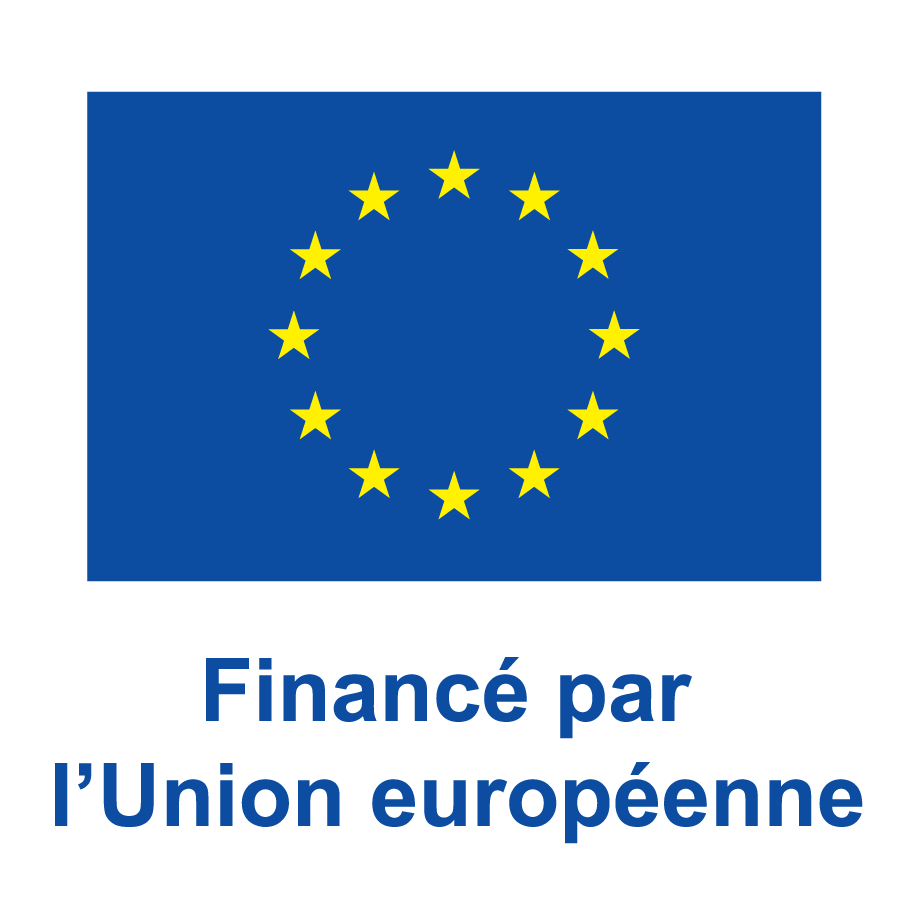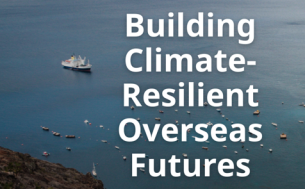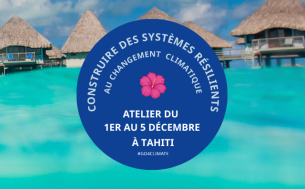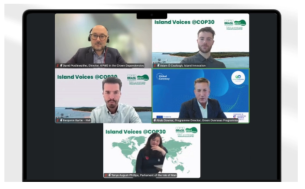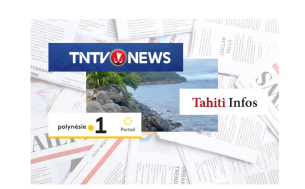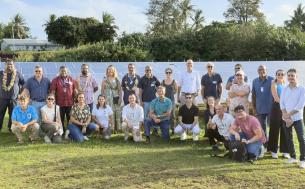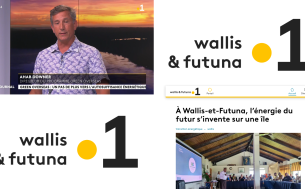
Publié le 14/10/2024, mis à jour le 14/10/2024
Day Four of the GO Climate Finance Forum: Innovations in Climate Financing
-
On the fourth day of the forum, participants explored cutting-edge innovations and mechanisms to strengthen financial resilience and private financing in the OCTs. The day focused on two types of innovations: those developed to enhance financial resilience and those applied to private financing. International experts and OCT representatives delivered lightning talks on various innovations, followed by “World Café” sessions in the afternoon.
-

Session 9: Innovations to strengthen financial resilience in OCTs
Shakira Mustapha, the Research Lead at the Centre for Disaster Protection, emphasized innovations in pre-arranged financial mechanisms for enhancing financial resilience against climate-related disasters. She explained that traditional post-disaster recovery often leads to debilitating debt and poverty, highlighting the need for solutions like pre-arranged financing, which constitutes only 1% of crisis financing but is gaining traction. These include risk retention instruments, such as contingent disaster loans and climate-resilient debt clauses that defer repayments, and risk transfer instruments like catastrophic insurance and catastrophe bonds, though usage remains limited. She stressed that there is no single best instrument, emphasizing the importance of timeliness, robust trigger conditions, cost-benefit analysis, and development impacts. Mustapha noted that these tools can be rapidly mobilized, with organizations like CCRIF targeting disbursement within 14 days. She called for further development of these mechanisms, encouraging complementary use, subsidy adaptations, and closer alignment with real-world needs to bolster financial independence and resilience.
-
Isaac Anthony, CEO of the Caribbean Catastrophe Risk Insurance Facility (CCRIF SPC), discussed innovative parametric insurance solutions established in response to Hurricane Beryl in 2004. CCRIF, which now includes 20 member governments, provides rapid payouts based on specific triggers such as hurricanes, allowing for quicker responses compared to traditional insurance. Since its inception in 2007, CCRIF has disbursed $358 million through 75 payouts, including $55 million to Grenada within 14 days. The facility has expanded its offerings to meet local needs, including insurance for the electricity, water, and fishing sectors, as well as agricultural and flood coverage in Ghana and Suriname. Anthony emphasized the importance of international partnerships for swift liquidity and enhanced climate protection in Caribbean nations.
Aholotu Palu, CEO of the Pacific Catastrophe Risk Insurance Company (PCRIC), addressed the challenges of accessing and affording financing in the Pacific, questioning the gap between available funds and their deployment. Founded in 2016 and launching its first product in Papua New Guinea in 2024, PCRIC aims to expand coverage across the Pacific. Palu highlighted the benefits of risk pooling for small nations, ensuring resources focus on education and capacity building. He also stressed the need for diverse efforts, enhanced technical capabilities, and clearer understanding of climate financing instruments, while advocating for stronger regional collaboration and accountability.
Ronny Tauhavili, Minister of Education for Wallis and Futuna, highlighted the significant challenges his territory faces in accessing climate financing. As a small and relatively unknown region with a complex governance structure, despite Wallis and Futuna's 63-year status, their climate resilience remains underdeveloped, largely managed by the French state due to the territory's administrative setup. Tauhavili expressed the need for greater autonomy, similar to New Caledonia and French Polynesia, to enhance financial accessibility. Wallis and Futuna are not members of the PCRIC, and current budget constraints hinder their resilience efforts, typically overseen by mainland France. They seek European Union assistance to negotiate direct eligibility with the French government as a Pacific entity, aiming for easier access to necessary funds to implement their Climate Action Plan. The lack of direct funding leads to political apathy, and Tauhavili emphasized the importance of raising political awareness and involvement in resilience efforts. He also mentioned their recent "Ocean" declaration, which aimed to assert maritime space co-ownership, highlighting ongoing struggles for recognition and independence in financial efforts.
Gail Hurley, Senior Development Finance Expert and Affiliate at the Resilient and Sustainable Islands Initiative (RESII), underscored the need for concessional financing and active involvement of donors and PTOM governments in risk pooling at a regional level. She highlighted how public development agencies can mitigate risks and debt burdens for Small Island Developing States (SIDS) exacerbated by environmental disasters. Hurley pointed to key opportunities for PTOMs through successful programs like CCRIF and PCRIF, suggesting they expand their tailored product offerings regionally. Emphasizing a multi-layered approach, she noted the importance of combining financial products to enhance coverage, particularly for sectors like fishing, agriculture, and vulnerable communities. She cited the Antigua and Barbuda project, where a differential fund was used to support households post-disasters, including 30% of financing reserved for women-led SMEs, advocating similar tailored support mechanisms to empower and protect underserved groups.
Session 10: Innovations in private financing
The late morning was dedicated to discussions on mechanisms to strengthen resilience financing in the OCTs and the opportunities available.
Alexander Julian, Associate Director at Willis Towers Watson, introduced the "Belize Blue Bond Resilience Wrapper," an innovative parametric solution aimed at enhancing financial resilience in Belize, which heavily relies on its ecosystem and tourism. This 20-year blue bond involves a debt conversion that includes a "resilience wrapper" for parametric insurance and a "credit wrap" for political risk insurance. The resilience wrapper covers semi-annual debt servicing when triggered by severe weather events. This approach has improved Belize's credit rating from CC to B-, reduced overall debt, and facilitated better access to private finance. Julian noted that such parametric structures can be adapted for various debt types, highlighting their versatility in promoting financial stability.
Joanne Balentien-Nicastia, CFO of the Water and Energy Company Bonaire (WEB), detailed innovative strategies for climate adaptation and resource management in Bonaire, a Dutch municipality. WEB manages water, wastewater, irrigation, and electricity, tackling challenges like growth, digital transformation, and predicted rising sea levels. With stable tariffs and strategic investments leading to significant revenue growth, the company has implemented measures like reverse osmosis for water purification and wastewater recycling for irrigation. Proposed initiatives include dam infrastructure and rainwater collection, requiring substantial funding. Balentien-Nicastia emphasized partnerships with companies and universities, utilizing Bonaire as a prototype for renewable energy integration. The adaptation strategy involves integrating diverse technologies and forming partnerships, exemplified by Contour Global's proactive sustainable energy investments, making Bonaire a testing ground for solutions that can be scaled to larger territories.
Olga Baus Gibert, Deputy Head of Unit at the Directorate General for International Partnerships of the European Commission, highlighted the innovative use of the Global Gateway initiative, adopted in late 2021, to transform the sargassum threat into an economic opportunity. The goal is to create a viable and sustainable value chain from this challenge. Current efforts are fragmented, necessitating cohesive action and collaboration. The EU has organized two EU-Caribbean conferences, involving public, private, academic, and governmental participants, including OCTs, to bridge financing gaps. The EU is providing non-repayable aid, with 80% interest from private sector partners, aiming to leverage sargassum in industries like textiles, cosmetics, biofuels, and electricity. The key challenge is organizing the collection and storage of sargassum to supply industry needs and transfer technology while fostering local employment and growth. Currently, the initiative includes sovereign loans, export credits, and grants, with contributions from France, Germany, Finland, Spain, Italy, and international financial institutions totaling €300 million. This combined industrial and financial approach aims to align all efforts towards developing a sustainable business model, with the potential for €350 million annually from algae production.
Kevin Richards, Founder and Managing Director of Bermuda Asset Management, highlighted Bermuda's innovative efforts in facing the climate crisis and its path to achieving net-zero emissions. Central to this initiative is the establishment of the "Bermuda Carbon Commission," which will produce Bermuda Carbon Credits (BCC) and manage an official registry and validator. This involves developing a national carbon strategy that integrates NDCs and monitoring tools for real-time credit tracking. The commission aims to validate and certify projects related to mangroves, seagrass, coral reefs, and floating solar, starting with the production of Blue Carbon Units. Richards also introduced the Island SDG Impact Fund, which dedicates $100 million to investing in tech companies aligned with the SDGs, supporting innovations like floating solar, waste-to-hydrogen, mariculture, and water filtration. Additionally, Bermuda Global Holdings plans to leverage debt finance to support infrastructure development. Through these initiatives, Bermuda seeks to become a model for sustainable practices, charting a new course for ocean and planetary health.
Katarina Kleinwege, Policy Officer at the EU's Directorate-General for Economic and Financial Affairs (ECFIN), emphasized the importance of the Invest EU program for financing innovation in Overseas Countries and Territories (OCTs). The program has three components: the Invest EU Fund, Invest EU Advisory Lab, and Invest EU portal. With €26 billion in budgetary guarantees, the Invest EU Fund aims to mobilize €370 billion for key European priorities, addressing funding gaps in underserved areas and supporting climate-related projects. Notably, 30% of its investments focus on climate initiatives. The program includes initiatives like the Sustainability Guarantee, which supports small and medium-sized enterprises and promotes sustainability through loan guarantees.
Angela Burnett-Penn, Climate Change Officer from the British Virgin Islands, highlighted innovative funding strategies beyond traditional EU mechanisms to support climate initiatives. She discussed the establishment of a Climate Change Committee and an autonomous Trust Fund designed to attract investments while providing access to international funding sources, including donations from prominent philanthropists like Richard Branson and Larry Page. Set to launch at COP30 in Brazil, the Trust Fund aims to address resilient land use, coastal infrastructure, and renewable energy projects. With a governance structure that includes both government and non-government stakeholders, the fund emphasizes full transparency and donor empowerment, allowing contributors to specify how their funds are used. This model fosters a collaborative approach to financing climate action while ensuring that political influences are minimized, thus paving the way for sustainable and impactful investment strategies.
Joseph Feyertag, Policy Fellow at the Grantham Research Institute at the London School of Economics, concluded by emphasizing that Bermuda and the Cayman Islands play a role as major hubs for insurance and reinsurance in the field of climate financing.
-
Session 11 : World Café: Opportunities, partnerships and tools
For this World Café, organized by ODI, Ramboll, and the Expertise France team, regional discussion groups were formed to address three themes: funding opportunities for disaster response and recovery; ppportunities for adaptation financing; opportunities for mitigation financing.
- Caribbean
Much of the conversation focused on ensuring a just transition to a low-carbon future, addressing affordability, justice, and the changing demands due to climate change. Proposed solutions included innovations in the circular economy, nature-based solutions, and enhancing transportation resilience through electric vehicles (EVs), which also present challenges for electricity grids. In crisis response and recovery, the group emphasized the gap between available funds and actual implementation, pointing to a need for forecast-based financing, contingency planning, and regional reserve funds. For financing adaptation, ideas like resilience bonds, environmental impact bonds for projects like mangrove restoration, and green bonds were discussed. However, challenges such as limited access to carbon markets and difficulties in communication between OCTs were noted. Enhancing regional knowledge sharing, tapping into diasporas to counter brain drain, and creating professional incentives were identified as essential steps, with suggestions like a WhatsApp group to improve coordination.
- Pacifique
The discussion emphasized several challenges and opportunities for island territories. In French Polynesia, the absence of an official adaptation strategy was noted, but the concept of a trust fund to support non-bureaucratic, small-scale projects was seen as promising, drawing inspiration from Caribbean models like KIWA. For Wallis and Futuna, limited access to finance for farmers and fishers highlights the need for economic structuring support. In terms of resilience, innovative funding sources like carbon credits for marine projects were discussed, alongside the need to integrate traditional materials like straw into construction to reduce carbon footprints. High construction costs and reliance on imported materials were common issues, with suggestions for combining traditional and modern methods to create more sustainable buildings. Energy solutions, such as solar panels on rooftops and sea water air conditioning, were also explored. The conversation on rapid recovery pointed out legislative barriers in French territories, such as erosion not being recognized as a risk, and a lack of essential data for disaster preparedness. Communication systems and pre-crisis tools need improvement, while turnover in government positions, like the prefect in Wallis and Futuna, hampers long-term planning. Collaboration between communities, regional partners, and governments was seen as key to improving disaster management and knowledge sharing across territories.
- North and South Atlantic
The discussion highlighted the unique challenges faced by remote islands with small populations, particularly logistical issues and retaining expertise. These territories often receive less attention and budget allocations for disaster risk and recovery due to fewer natural disasters, although risks like pandemics are equally relevant. Small administrations can be more responsive, but they face difficulties in accessing finance and technical expertise, especially with instruments not tailored for small territories. A key point was the need for differentiated access to finance, as many territories cannot carry debt, limiting their use of bonds and loans. Alternative solutions like carbon and biodiversity credits were discussed, though these require extensive baseline data. Trust funds and the UK’s Overseas Biodiversity Strategy were also seen as promising avenues for future opportunities. In terms of powering resilience, there is a focus on transitioning to renewable energy, but many islands have outdated grid systems, making full renewable integration complex and costly. The group emphasized the need to tailor energy targets, with the realization that achieving 100% renewables may not always be the most feasible or beneficial goal. Common challenges across territories suggest the need for more coordinated efforts, even though they may lack a regional organization.
